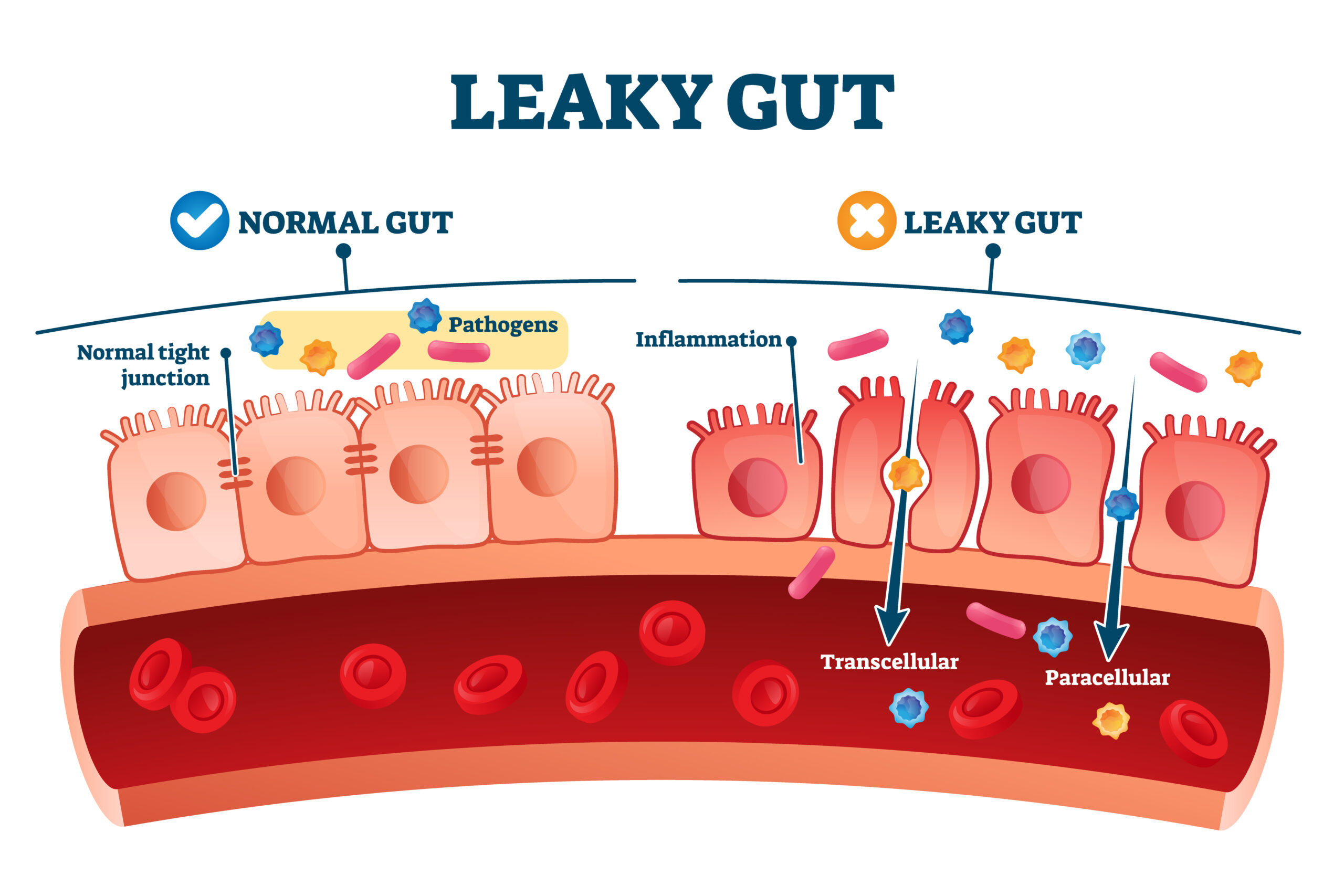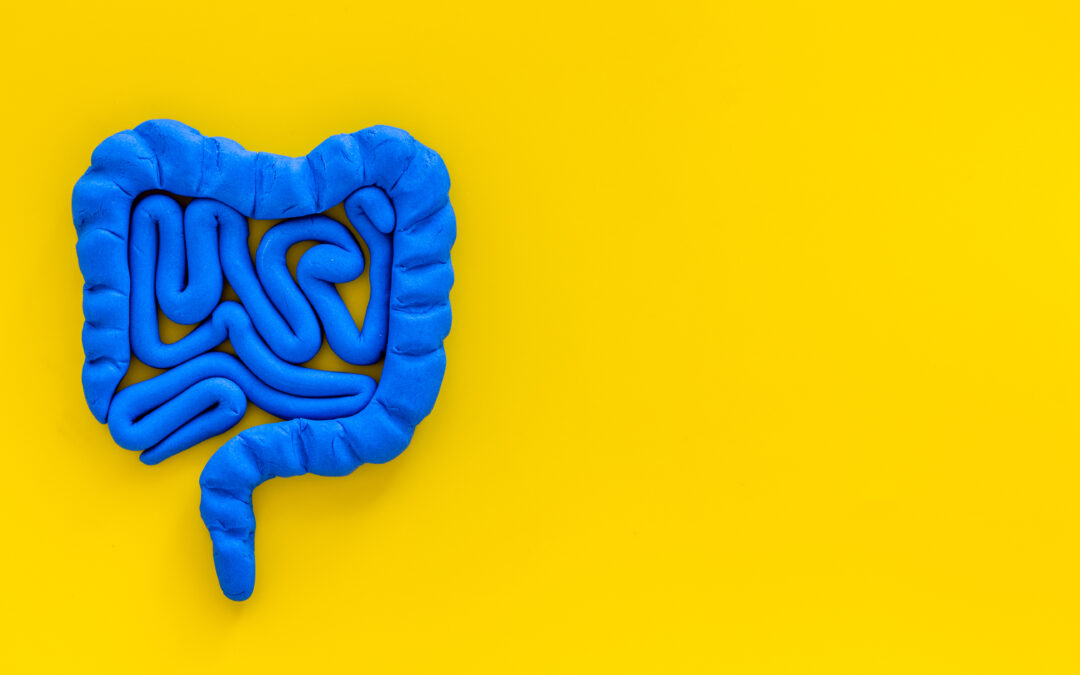All disease begins in the gut. – Hippocrates
In fact today we are seeing that imbalances in the gut can lead to a wide range of health and wellness issues.
What is the Gut Anyways?
The gut is comprised of the microbiome, an ecosystem comprised of your intestinal bacteria, as well as the gut lining of your small intestine. The main purpose of this small intestine is to absorb the nutrients from your food. The cells that line your small intestine join together to create a tight barrier that acts like a security system and decides what gets absorbed into the bloodstream and what stays out.
Leaky Gut
Also known as, intestinal permeability, leaky gut is when the gut lining of the small intestine is damaged. Our small intestine serves as a filter to absorb nutrients through its one cell membrane. If it is damaged, we not only absorb nutrients but other food molecules and toxins pass through into the blood stream and then the body sees these as invaders; your immune system becomes overactive and begins to produce inflammation throughout the body. This gut lining is as thin as a tissue paper but has the total surface area of a tennis court. It is important to note that in certain diseases it is still not clear if intestinal permeability is a symptom or a cause of the chronic disease.
How do I know if I have leaky gut?
Common symptoms of leaky gut have a wide range, these can be:
- Bloating or gas
- Food sensitivities or allergies
- Skin problems
- Joint pain
- Mood issues (depression, anxiety, ADD…)
- Weight issues
- Weak immune system
- Fatigue
- Brain fog, memory problems
- Intestinal symptoms (bloating, diarrhea, constipation, altering constipation-diarrhea)
Studies have even associated leaky gut with more serious health problems like autoimmune disease, such as type 1 diabetes, rheumatoid arthritis and celiac disease.

What to do about Leaky Gut?
The good news is that there are natural solutions to leaky gut, the microbiome is an ecosystem in constant change, the cells of the intestinal lining regenerate every 6 days.
The best way to oversee this process of reconstruction is using the 5R method:
- Remove
- Replace
- Reinocculate
- Repair
- Rebalance
Let’s look a this in further detail:
1. Remove
This means removing the stressors and sources of irritation that are creating the problem. In this case, it could be a food intolerance (see elimination diet), or the following foods:
- refined and processed foods,
- artificial chemicals
- artificial sweeteners
- sugar
- gluten because it contains zonulin, a protein that according to research may increase intestinal permeability
- inflammatory cooking oil
But also:
- dietary toxins, pesticides, GMOs, heavy metals, …
- chronic stress has been known to negatively affect the microbiome.
- Lack of exercise
- Poor sleep
- Dysbiosis: low levels of healthy gut bacteria and more pro-inflammatory species dominate the gut
We also know that certain drugs damage the gut lining; these include antibiotics, proton pump inhibitors (such as Nexium), steroids, long term use of nonsteroidal anti-inflammatory drugs (aspririn, ibuprofen…) and the birth control pill for women. Talk to your doctor before altering any drug treatment. Sometimes the culprit can also be a small intestine bacterial or yeast overgrowth or parasites (SIBO or SIFO) living in the intestines. Stool exams as well as identifying certain specific symptoms can help determine the presence of any of these and the following can then be treated. Here the key is to remove inflammation, eating to reduce inflammation is more important than eating to feed your gut because inflammation fuels unhealthy bacteria.
2. Replace
what may be lacking. This can either be fibre or digestive aids. We want to improve digestion and make sure that food arrives in the small intestine ready for nutrients to be absorbed. Think natural digestive aids such as enzymes but also if stomach acid is not sufficient you can add natural bitters before meals or other specific supplements.
3. Reinoculate
Here we want to put in prebiotics and probiotics in supplement and food form.
4. Repair
Repair your cell lining eating good quality protein and introducing nutrients to help in the process such as L-glutamine, zinc, vitamin A, D, E, fish oil. Other foods such as colostrum and bone broth are also effective at repairing the gut lining. Choose whole-foods, leaving behind any refined and overly transformed foods, aim for a plate full of 75% plant based foods.
5. Rebalance & Relax
Rebalance your microbiome by using stress busting techniques such as meditation and breathing exercises are just as important adapting a whole foods diet rich in plant-based foods, fish, whole grains and fermented foods. Many studies have shown the Mediterranean diet to be excellent for the gut but traditional Korean, Japanese, Northern and African traditional diets are just as good. What is important to note here is that we not replicate another population’s or culture’s diet but we follow our own ancestral diet. For example if you are an American from European descent you would do much better on a Mediterranean diet or a Nordic diet than a South-American diet. Remember to also eat mindfully, this assures proper digestion. An active lifestyle as well as quality sleep are also key to a healthy gut.
Conclusion
According to Frank Lipman, author of: ‘How to be Well’, two of the most important things you can do for your health are protect your gut microbiome and reverse any gut dysfunction. In this article we went through the step by step protocol to reverse any gut hyper permeability. In next week’s article we will further discuss how to protect and maintain a healthy gut. Stay tuned and stay healthy!


